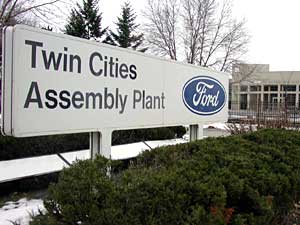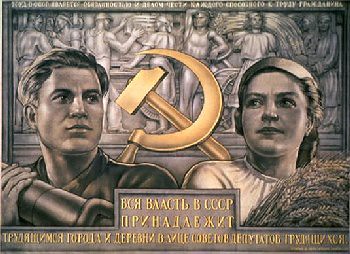This is dedicated, in a comradely spirit, to all those who will join the protest sponsored by the Coalition to March on the RNC and Stop the War on Sept 1, 2008. The Gus Hall Action Club has endorsed the Coalition to March on the RNC and Stop the War's call for demonstrations during the Republican National Convention (RNC). The Gus Hall Action Club, waving a red Soviet flag and a flag with our club's logo, will be at the mass anti-war rally and march on Sept. 1, 2008 @ 11:00 a.m. at the State Capital in St. Paul, Minnesota.The Gus Hall Action Club, our Communist club in central Minnesota, links the fight against state-monopoly capitalism (the essence of which is direct union of the power of the capitalist monopolies with the enormous power of the state) with the fight against imperialist war. We are Marxist-Leninists and
Marxism-Leninism is "a science in the finest sense of the word." (Ponomarev,
Marxism-Leninism: A Flourishing Science, 1979, International Publishers) We are also working-class anti-war activists and we participate in many demonstrations in the Twin Cities, Minnesota against imperialist war. We say:
U.S. Out of Iraq and Afghanistan NOW! No War Against Iran! For Mass Struggle Against Imperialism! and Slash the Arms Budget! Gus Hall, the former Marxist-Leninist leader of the Communist Party USA, said "
there is only one way to get the country out of the economic mess it is in: the way the Communist Party has repeatedly called for--to slash the arms budget!" (Gus Hall,
Basics, 1980, International Publishers)
We in the Gus Hall Action Club are unique in the anti-war movement in the Twin Cities, Minnesota, because
we openly and boldly promote Marxist-Leninist ideology and encourage folks to read books by Karl Marx, Frederick Engels, V.I. Lenin and American Communists like Gus Hall. We believe that "
without Marxism-Leninism, it is impossible to understand and accurately assess imperialism, the origin, inner content, and development prospects of state-monopoly capitalism and its many-sided general crisis, or to draw conclusions from this for the revolutionary class struggle." (Ponomarev,
Marxism-Leninism: A Flourishing Science, 1979, International Publishers)
We in the Gus Hall Action Club also stand out because of our emphasis on the working class. Marx and Engels said, in the
Communist Manifesto, that "of all the classes that stand face to face today with the bourgeoisie today, the proletariat alone is a really revolutionary class" and we believe that the working class possesses the power to end war forever. For us in the Gus Hall Action Club, the word "working class" is not a mere decoration in our rhetoric. The working class is our basis. We reject any "warmed up version of the old story that the working class has become fat, complacent, submissive and totally corrupt" or that it is "a partner of monopoly capital in its imperialist exploitation." (Gus Hall,
Working Class USA, International Publishers, 1987)
The book
Marxism-Leninism: A Flourishing Science is right that "it is only the Marxist-Leninist approach to war and peace that ensures a correct policy." And "there are no more principled and determined adversaries of war than the Communists. War brings riches to a handful of monopolists, and hardship, privation and grief to the working people." (Ponomarev,
Marxism-Leninism: A Flourishing Science, 1979, International Publishers)
The system of state-monopoly capitalism and imperialism breeds wars for maximum corporate profit. In 1916, V.I. Lenin made an exhaustive scientific analysis of imperialism in his classic work
Imperialism--the Highest Stage of Capitalism, as well as in a number of other works. Lenin showed that imperialism is a special stage--the highest and last--in the development of capitalism.
"Imperialism," V.I. Lenin taught, "is capitalism at that stage of development in which the dominance of monopolies and finance capital has established itself; in which the export of capital has acquired pronounced importance; in which the division of the world among the international trusts has begun; in which the division of all territories of the globe among the great capitalist powers has been completed." (Lenin,
Imperialism--the Highest Stage of Capitalism, 1916)
William Z. Foster, a great union activist and former leader of the Communist Party USA, summed up Lenin when he said: "Imperialism sharpens and intensifies all the contradictions of the capitalist system and precipates the present era of world wars and socialist revolutions." (William Z. Foster,
Twilight of World Capitalism, 1949, International Publishers)
 (V.I. Lenin)
(V.I. Lenin)In order to achieve maximum corporate profits in the modern era, imperialism commences an era of struggle and war for the redivision of an already divided world. The "imperialists are playing with fire." (Otto Kuusinen, main author,
Fundamentals of Marxism-Leninism, Foreign Languages Publishing House, Moscow) As long as imperialism exists, the danger and reality of war will remain.
William Z. Foster explains that imperialism is against the interests of the working class of the United States:
"Wall Street's imperialist expansionism is directly antagonistic to the basic interests of the overwhelming majority of the American people, as well as to those of other peoples. The gigantic expenditures for the armaments program that imperialism produces have sent the cost of living soaring. It sabotages, too, all efforts to establish better government insurance against unemployment, sickness and old age. It is also undermining democracy in this country and is provoking the most serious danger of fascism...What true interest can our nation have in such a program of oppression, profit-grabbing and butchery?" (William Z. Foster,
Twilight of World Capitalism, 1949, International Publishers)
Gus Hall, former leader of the Communist Party USA until his death in 2000, said that: "
There is only one way to get the country out of the economic mess it is in: the way the Communist Party has repeatedly called for--to slash the arms budget! Slashing the arms budget, dismantling the foreign bases, ending the tax loopholes of the monopolies, controlling their transfer of dollars abroad--that's the only way." (Gus Hall,
Basics, 1980, International Publishers)
The people of Iraq and the world have a right to be free from U.S. imperialism. Otto Kuusinen says that "
Marxism has been from the very outset an irreconcilable enemy of national oppression in any form and has consistently fought for national equality, for the complete freedom and self-determination of the nations. The formula elaborated by Marx and Engels, 'a people that oppresses other peoples cannot itself be free,' Lenin termed as the 'fundamental principle of internationalism.' And proletarian internationalism is an inalienable part of Marxism." (Otto Kuusinen, main author,
Fundamentals of Marxism-Leninism, Foreign Languages Publishing House, Moscow)
Otto Kuusinen, friend of Lenin, major figure in the Communist International and one of the founders of the Finnish Communist Party said that the working class possessed "weapons of struggle" against war and war preparation:
"
A special responsibility falls on the working class and its revolutionary parties now that the war danger created by imperialism has greatly increased...
"Modern war is mainly a war of machines, of armaments, but these are made by the hands of workers; workers also form the cores of the mass imperialist armies... The working class is in a position to force the capitalist ruling classes to reckon with its will. But for this to happen its will must be clearly expressed in the form of mass anti-war actions, constant pressure on the bourgeois parties, parliaments and the press, and the exposure of the underhand plotting and intrigues of the imperialist government.
"It should not be forgotten that the working class also has so potent a weapon of struggle against war and preparation for war as strikes, refusal to fill war orders and transport war cargoes intended for aggressive purposes." (Otto Kuusinen, main author,
Fundamentals of Marxism-Leninism, Foreign Languages Publishing House, Moscow)
Mass struggle is the answer. "The war hawks always dominate U.S. government policy when the people are silent," Gus Hall stressed, but "mass actions can influence government policy...(and) drive the warmongers out of public office forever." (Gus Hall,
Basics, 1980, International Publishers)
"We Communists point out that wars are inevitable during capitalism. This means that capitalism inexorably breeds imperialism and war, but it does not mean that every international tension must develop armed hostilities...The democratic forces of our country and the world are strong enough to bridle the warmongers, that is, the big capitalist imperialists, if they will but awaken and assert their irresistible peace will. They can not only delay war, they can abolish it altogether. One thing is clear--war will always come unless the ways are found by the people to check the war-making expansionism of American imperialism." (William Z. Foster,
Twilight of World Capitalism, 1949, International Publishers)
 (William Z. Foster, former leader of the Communist Party USA)
(William Z. Foster, former leader of the Communist Party USA)But
only socialism will end war forever. "The danger of war," William Z. Foster said, "can be finally eliminated, however, only when monopoly capital is decisively defeated by the people, especially big capital here in the United States. This country, precisely because it is the chief center of monopoly capitalism, is at the same time a fortress of world reaction and warmongering." (William Z. Foster, "Twilight of World Capitalism," 1949, International Publishers)
The book
Marxism-Leninism: A Flourishing Science correctly says that "it is enough to glance at the...bourgeois parliaments and governments to fully appreciate the fact that their links with the (capitalist) monopolies have grown stronger and more organic." (Ponomarev,
Marxism-Leninism: A Flourishing Science, 1979, International Publishers) But Lenin said: "our aim is to create a socialist system of society, which by eliminating the divisions of mankind into classes, by eliminating all exploitation of man by man and nation by nation, will inevitably eliminate the very possibility of war." (Lenin,
War and Revolution, 1917)
"Only with the establishment of socialism," William Z. Foster wrote, "can the war-fascist danger be abolished outright. The great industries, the banks, the basic natural resources, and the political control of society must all be taken out of the hands of the capitalists and placed in the hands of the people, with the working class playing the leading political role." (William Z. Foster,
Twilight of World Capitalism, 1949, International Publishers)
There is a historical necessity for the dictatorship of the proletariat. Otto Kuusinen points out that "the founders of Marxism-Leninism teach that the revolutionary dictatorship of the proletariat is the only force capable of effecting such a transformation.
What is the dictatorship of the proletariat? It is power in the hands of the working people, led by the working class and having as its aim the building of socialism." (Otto Kuusinen, main author,
Fundamentals of Marxism-Leninism, Foreign Languages Publishing House, Moscow)
And "the dictatorship of the proletariat is the
crux of Marxism." (Afanasyev,
Marxist Philosophy, Foreign Languages Publishing House, Moscow)
William Z. Foster continues: "This, and only this, will cut out reaction at the root. There is no other way to avoid the rising danger of devastating war, economic chaos, and the malignant cancer of fascism--all precipitate by American imperialism...
"American socialism would do much more than merely put a stop to the reaction and danger of monopoly capital. It would open up a whole new period of peace, democracy and prosperity for our people. The tremendous productive apparatus of our country, instead of depending upon wars and a war economy to keep it in operation, would find, under conditions of production for use, a boundless outlet for its commodities among our peoples and the famished nations of the world. Instead of being the property of a small minority of capitalists and utilized primarily for their enrichment, which constitutes a monstrous anomaly, the industries would be owned by the people and operated for their benefit. Under socialist conditions, the United States would embark upon the development of the greatest prosperity and well-being its people have ever known." (William Z. Foster,
Twilight of World Capitalism, 1949, International Publishers)
More than ever it must be asserted that "Marxism-Leninism has not grown old and never will"! (Ponomarev,
Marxism-Leninism: A Flourishing Science, 1979, International Publishers)










